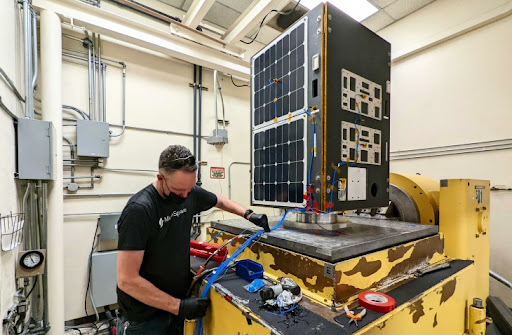““It has never been more essential to understand the impact of climate change on our planet. But, to gather planetary insights at scale requires going to space; and, frankly, space is hard.””
When it comes to understanding our changing world, space is the ultimate high ground. Last week Muon Space, a pioneering developer of satellite-based climate intelligence, announced its Series A financing led by Radical Ventures (read TechCrunch’s coverage here). The world-class Muon Space team is catalyzing the fight against climate change by becoming the leading source of actionable planetary intelligence. Founded by veteran technology and aerospace leaders, Muon Space is launching hundreds of scientific-grade sensors into space to help every business better understand and react to our changing planet. Google and the Environmental Defense Fund are already customers.
Satellite data provides insights on everything from soil quality to pollution monitoring. For almost every business, gaining access to new, sophisticated data from space remains incredibly difficult. Embarking on missions to collect data from space requires deep satellite and remote sensing expertise to design, build, launch and operate. Turning those new data sets into useful insights requires yet more expertise. Through its turnkey Scientific Earth Observation services, Muon is helping organizations that do not have space competency develop and utilize space-based observations.
Muon Space brings Earth remote sensing capability to a broad array of organizations and institutions who lack the expertise and resources necessary to develop it themselves. Helping the company deliver on this ambition is Muon Space’s CEO and Co-founder, Jonny Dyer. Before Muon, he was Principal Engineer at Google Geo and Chief Engineer at the satellite imaging company Skybox Imaging. As Jonny puts it: “The only way organizations can make meaningful decisions around how to respond to climate change and monitor the efficacy of those decisions is to have access to timely, high-quality data. Muon Space’s platform makes getting insights from space fast, reliable and low-friction.”
AI News This Week
-
These Canadian startups are taking quantum computing mainstream (CBC)
Three times a quantum computer has tackled a problem out of reach of an ordinary computer. The first was by Google in 2019, and the second was by a team of Chinese researchers in 2020. Radical Ventures portfolio company Xanadu has achieved the third published earlier this summer in Nature with its computer called Borealis. “If we ran [the problem] on the most powerful supercomputer out there, it would take 9,000 years. For Borealis, it takes less than a second, which is quite incredible,” notes Christian Weedbrook, CEO of Xanadu, in the article. Startups in the sector are booming, with 23 quantum businesses based in Canada, according to McKinsey & Co.
-
New algorithm aces university math course questions (MIT News)
A team of researchers from MIT, Columbia University, Harvard University, and the University of Waterloo has used a neural network to solve university-level math problems in seconds at a human level. The work could be used to streamline content generation for courses. The system could also be used as an automated tutor that shows students the steps involved in solving undergraduate math problems opening avenues for personalized learning. The paper was published in the Proceedings of the National Academy of Sciences earlier this month.
-
AI systems cannot patent inventions, US federal circuit court confirms (The Verge)
A US federal circuit court has ruled that AI systems cannot patent inventions. This is the latest setback in a series of legal battles by computer scientist Stephen Thaler to copyright and patent the output of various AI software tools he has created. The Patent Act clearly states that only human beings can hold patents, says judge Leonard P. Stark. The ruling upholds the status quo for AI patent law in the US, and follows similar decisions from other international courts. Thaler plans to appeal the circuit court’s ruling.
-
Think your street needs a redesign? Ask an AI (Bloomberg)
The Internet is full of bizarre images generated by AI. But how can these text prompt image generators be useful? Urban planners are using the technology to reimagine roadways to be more friendly to pedestrians and bikes. “Council members and urban planners from all over the country seem to be very inspired by the images,” noted Zach Katz, an urban planner who started generating re-imagined city views and posting them on a Twitter account. The account now has a significant backlog of requests as others look to bring their visions to life and inspire local decision-makers to make improvements.
-
Just for fun: Man who threw away £150m in bitcoin hopes AI and robot dogs will get it back (The Guardian)
A computer scientist accidentally discarded a hard drive containing 8,000 bitcoins in 2013 during an office clearout. He believes it is sitting in a dump in Newport, South Wales and has hatched a £10 million scheme to find it with a team of experts. His proposal uses AI to operate a mechanical arm and filter the garbage before being picked by hand at a pop-up facility near the landfill site. If successful, he plans to use the money to help the community and invest in a number of city projects.
Radical Reads is edited by Ebin Tomy.





![[shared] Radical AI Founders promo 1200 x 628](https://radical.vc/wp-content/uploads/2024/09/shared-Radical-AI-Founders-promo-1200-x-628.jpg)